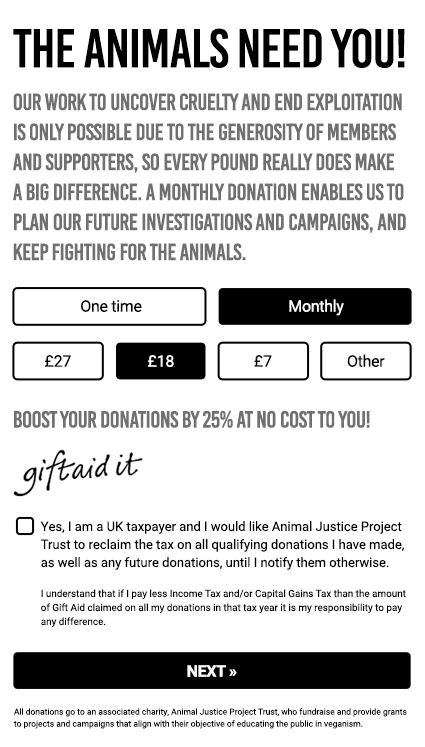
We must act urgently against this industry that is not only causing untold suffering to chickens, but creating breeding grounds for our next pandemic, accelerating antibiotic resistance and destroying our environment. The mass-scale exploitation of chickens must be stopped before it’s too late - and you, as the consumer, have the power to create meaningful change.
Over 68 billion chickens are killed annually across the globe for their flesh, with 1,183,000,000 of these slaughtered in the UK. Billions of lives stolen to satisfy consumers’ taste buds.

The modern ‘meat chicken’ has been selectively bred to reach up to an excruciating 4.2kg, compared to those in the 1950s who weighed 900g by the same age. The average weight for chickens exploited for ‘meat’ has quadrupled over the past 70 years, to the detriment of their health.
Over 95 percent of British ‘broiler’ chickens are kept inside Intensive Poultry Units (IPUs), which house over 40,000 birds under one roof. Packed in at high densities, conditions are crowded and stressful. Being predisposed to grow at such a rapid pace, the birds’ bodies take up more and more floor space each additional week of their short lives. The huge flocks become so densely packed that the floor cannot even be seen, and the chickens are unable to move. Aggressive behaviours are commonplace amongst distressed birds, whose injuries go untreated and often become fatal.


'Meat chickens’ are unable to escape the foul smell of weeks' worth of faeces. Ammonia levels become dangerously high as waste builds, causing serious respiratory issues as the birds’ lungs burn.


Birds as young as a week old develop circulatory disorders as their hearts strain just to keep their oversized bodies alive. They grow too heavy for their legs to support, causing muscle wastage and bones to fracture under pressure. They become Prisoners in their Own Bodies, unable to move.
Many birds die slowly from starvation or dehydration, too weak to walk to food and water. Survivors develop excruciating sores and burns on their delicate skin from prolonged contact with ammonia-rich faeces.


Over one million chickens die inside IPUs every week in the UK as a result of the unsurvivable conditions in which they’re forced to live. Those who survive to around six weeks old are usually gassed in slaughterhouses, suffocated to death for a supermarket product. They experience severe distress, shaking their heads and gasping for air.
Chickens are sentient animals, feeling every second of pain. With plenty of vegan alternatives available today, there are no excuses to force animals to live lives as Prisoners in their Own Bodies. We need to tip the scales in favour of chickens, and choose vegan.

Over 75 percent of infectious diseases are zoonotic; they originate in animals. Dirty broiler farms are the perfect deadly incubator, housing sickly birds who are susceptible to contagious diseases. Once aware of an outbreak, farmers are obligated, under UK legislation, to kill chickens “without delay”, tossed aside like biohazardous trash.
With the global mortality rate for the widespread H5N1 strain of bird flu at 50 percent, The World Health Organisation has warned about the possibility of up to 150 million humans around the world losing their lives in a future Avian influenza pandemic. We must stop funding an industry that is willing to kill animals and humans for fast profit.


Billions of chickens are routinely medicated to slow the development of illnesses caused by poor living conditions. When antibiotic drugs are taken at low levels over extended periods, harmful bacteria can mutate and become resistant to life-saving drugs.
Human fatalities from Campylobacter (food poisoning) are becoming more common, with 40 percent of E.coli bacteria now resistant to antibiotics in the UK. The UN has warned that 10 million human lives could be lost every year by 2050 if we do not take action immediately. We must choose plant-based in order to avoid going back to a pre-medicine world.


High levels of nitrous oxide are emitted from ammonia-rich chicken faeces. This greenhouse gas has 300 times more impact on climate change than carbon dioxide, contributing to extreme weather events and natural disasters.
.png)

Bodies of water are unable to sustain life when excess nitrogen stimulates algae overgrowth, which depletes water of oxygen and blocks sunlight from aquatic plants. Countless free-living aquatic animals die as a result of algal blooms, reducing biodiversity.
Ammonia emissions from chicken farming are a direct threat to human lives, with particles causing respiratory illnesses like asthma and lung cancer.


Take action against the damage Intensive Poultry Units (IPUs) have on chickens, public health and our environment by signing our open letter to East Lindsey District Council.






© Copyright 2025 | All Rights Reserved